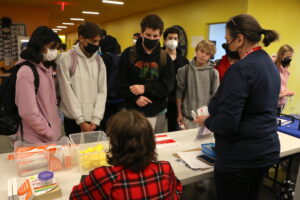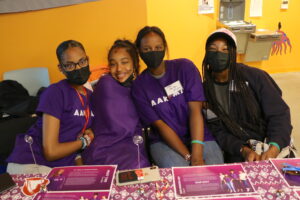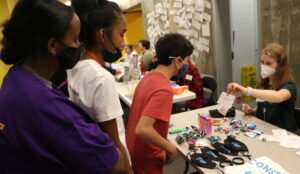SEL Focus: Self-Management
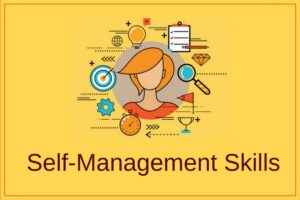
What is Self-Management?
Self-management is an essential component of social emotional learning. Building from the foundation of self-awareness, the Collaborative for Academic, Social, and Emotional Learning (CASEL) defines self-management as, “the ability to successfully regulate one’s emotions, thoughts, and behaviors in different situations.” This regulation is achieved by effectively managing stress, controlling impulses, and motivating oneself. In short, self-management is the ability to set and work toward personal and academic goals without significant deviation.
What Skills are Associated with Self-Management?
To possess self-management, one must develop the following skills and abilities:
- Impulse control – Impulse control relates to the idea of delayed gratification. This refers to the ability to distract oneself from a desire in order to delay that impulse. Impulse control, then, is the ability to not act on immediate impulses, but rather delay that action for a period of time.
- Stress management – Stress management can occur through a variety of strategies. Teachers should expose students to several different methods through discussion and implementation. Having a solid foundation of self-awareness will allow students to determine when they are stressed so that they can implement practiced strategies with more success.
- Self-discipline – Self-discipline requires an individual to control one’s feelings and impulses. Also known as willpower, self-discipline allows us to ignore other stimuli in order to focus on the goal at hand and follow our plans despite distractions.
- Goal setting – Research has found that students tend to find more success when working with individually set goals. These goals, however, need to be SMART (Specific, Measurable, Attainable, Realistic, Timely) so as to better prepare students to successfully meet them.
- Self-motivation – Intrinsic motivation is a skill that is difficult to teach. Students must develop their own internal push that will keep them moving toward a goal. Having developed a specific goal is a great start to employing self-motivation. The chapter “Hill, Skill, and Will” by Seanna Moran and Howard Gardner in Lynn Meltzer’s book Executive Function in Education From Theory to Practice discusses the idea of volition through obstacles, skills necessary to surmount those obstacles, and the will that is required to find success in that process.
- Organizational skills – Organizational skills can refer to the organization of physical space and materials, mental pictures and information, and time. Keeping our work areas uncluttered, as well as storing materials in a neat and organized manner for easy access, allows for more productive work time. Filtering information to be relevant to the topic at hand with a clear big picture can help to keep us on track. Lastly, keeping track of time and being aware of time commitments can help us to meet expectations.
Strategies of Self-Management or Self-Control

The skill of self-control has been likened to a muscle. Every time we use it, it drains us a little bit. Being demanded to use it constantly will exhaust us completely and is not sustainable. Using self-control in small doses, however, helps us, over time, to build up that “muscle” so it becomes stronger and more “fit” when we need it.
It is important to select developmentally appropriate tasks when helping children foster self-control competencies. Even though self-control improves over time, there can be quite some differences in children of the same age. When helping children develop self-control skills, try setting up simple goals first, where success is expected, before moving onto the next goal. For preschoolers, goals might include not interrupting or not fighting on the playground. For an early elementary school student, appropriate goals might be complying with bedtime rules or showing frustration appropriately. Some general strategies that often help children learn appropriate self-control behaviors include:
- Take a break: encourage children to take a break or ‘time in’ (such as turtle time) whenever they feel overwhelmed, angry, or frustrated. Stepping away from an upsetting situation can help a child calm down.
- Teach and provide attention: Paying attention is a skill that can be taught. Encourage children to resist interrupting by learning how to observe others when not talking, so they can join in appropriately. Make sure to provide children with appropriate attention at times so they don’t feel ignored and therefore are more likely to interrupt.
- Use appropriate rewards: to foster positive behavior children need consistent positive feedback. Praise and consistent feedback can be highly rewarding for young children, as is special time with a parent. It is important to let a child know what is a desired behavior.
- Use activities designed to teach self-regulation: using specific activities can help parents and teachers teach (young) children skills that foster self-control. Some of these skills include dealing with “wanting something I can’t have”, understanding feelings, and controlling anger.
Recommended Books to help teach young children about Self-Management

In these picture books, you will find characters who illustrate the benefits of self-management by showing:
- Improved confidence and self-esteem
- Increased motivation and enthusiasm
- Increased ability to set and achieve goals
- Improved study skills and academic performance
- Having pride and confidence in achievements
- Understanding that meeting goals and challenges is not always easy

Again! By Emily Gravett
A dragon wants his bedtime story again and again. When his mother falls asleep during the fourth reading the dragon cannot control his emotions and burns a hole through the back of the book! Promotes manners, self-management and emotions.

Bug in a Vacuum by Melanie Watt
A bug is sucked into a vacuum bag as it flies around a house. It goes through the five stages of grief as it tries to come to terms with its situation. This book will help children understand the different emotions involved in unexpected, disappointing, and sad events.

Eat Pete! By Michael Rex
A monster visits Pete with plans to eat him. But Pete is thrilled to have someone to play with and keeps the monster busy. Will he ever get to eat Pete? A humorous picture book about friendship and self-management.
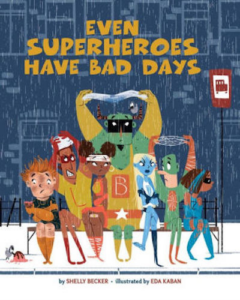
Even Superheroes Have Bad Days by Shelly Becker
Help children cope when they are feeling overwhelmed by reading about how Superheroes manage their emotions when they are having a bad day.

Fergal is Fuming! By Robert Starling
Fergal the dragon can’t keep friends, because of his short temper, particularly when he doesn’t get his own way. He notices others have effective strategies to calm down and he finds his own way to cool down. This book reinforces self-management, a growth mindset, and balance.

There’s No Dream Too Tall
Shows kids that their different strengths can help them become who they want to be.

A Grown-up’s guide to kids wiring
Kathleen Edelman focuses on the 4 temperaments and how to communicate with each one. There are free videos that go along with this, and if you love to know the “why” of certain decisions and behaviors, you will love this one.
May is Mental Health Awareness Month
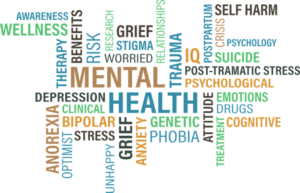
With mental health entering more and more of our daily conversations, it’s critical that everyone has a solid foundation of knowledge about mental health. That’s why for Mental Health Month this year, Mental Health America is going Back to Basics.
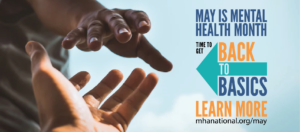
Since the start of the pandemic, more and more people are talking about mental health. An increasing number of folks are starting to see it for what it is: one important component of your overall health and well-being, just like your physical health. But mental health conditions, resources, and conversations can still feel complicated and out of reach.
Are there common warning signs for mental health conditions or crises? Specific factors that can lead to mental health conditions or even crises? What resources are out there – and how do I know if they’re right for me?
Many people are learning about mental health topics for the first time. Having a widespread understanding of the topic can help you be more informed if you or someone you know is experiencing a mental health condition or crisis. Around half of people in the U.S. will meet the criteria for a diagnosable mental health condition at some point in their life, so everyone should know what to look out for.
Everyone should have the support needed to thrive. Communities that have been historically and presently oppressed face a deeper mental health burden because of the added impact of trauma, oppression, and harm.
There’s often no one single cause for a mental health condition. Instead, there are many possible risk factors that can influence how likely a person is to experience a mental health condition or how serious the symptoms may be.
Some risk factors for mental health conditions include: trauma, which can be a one-time event or ongoing; your environment and how it impacts your health and quality of life (also known as social determinants of health like financial stability and health care access); genetics; brain chemistry; and your habits and lifestyle such as a lack of sleep.
Of course, understanding the risk factors for a mental health condition can be more difficult when it’s your own mental health. Take time to ask yourself about your thoughts, feelings, and behaviors to see if this is part of a pattern that may be caused by a mental health condition.
Here are some questions to get you started:
• Have things that used to feel easy started feeling difficult?
• Does the idea of doing daily tasks like making your bed now feel really, really hard?
• Have you lost interest in activities and hobbies you used to enjoy?
• Do you feel irritated, possibly to the point of lashing out at people you care about?
Our society focuses much more on physical health than mental health, but both are equally important. If you are concerned about your mental health, there are several options available. You are not alone – help is out there, and recovery is possible. It may be hard to talk about your concerns, but simply acknowledging to yourself that you’re struggling is a really big step.
Taking a screen at mhascreening.org can help you to better understand what you are experiencing and get helpful resources. After that, consider talking to someone you trust about your results, and seek out a professional to find the support you need.
While you may not need this information today, knowing the basics about mental health will mean you’re prepared if you ever need it. Go to mhanational.org/may to learn more.
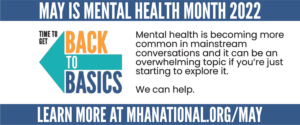
Here are two articles that include APS student services staff voice on the state of mental health in our community.
“Helping with Stress Management for Teens”https://psychcentral.com/stress/teen-stress?utm_source=ReadNext
“The Kids are Not Alright”https://www.arlingtonmagazine.com/teens-pandemic-mental-health/
APS Highlight
HB Woodlawn’s Mental Health Fair
HB Woodlawn hosted a Mental Health Fair on Thursday April 28th. The Student Services Team welcomed 14 different organization for the students to speak with regarding mental health such as Hands2Heart, Doorways, SAFE Project, The AAKOMA Project, and the American Foundation for Suicide Prevention, to name a few. It was a great success!
May is National Prevention Awareness Month

National Prevention Week (NPW) is a national public education platform bringing together communities and organizations to raise awareness about the importance of substance use prevention and positive mental health
Drug and Alcohol Prevention and Education Resources:
Press release: https://www.alexandriava.gov/news-dchs/2022-05-04/city-of-alexandria-officials-warn-of-dangers-posed-by-recent-spike-in-opioid
APS AARI website: https://www.arlingtonva.us/Government/Programs/Health/Arlington-Addiction-Recovery-Initiative.
APS Substance Abuse Counselors https://aps2016.apsva.us/student-services/substance-abuse-counselors/contact-us-2/
Fentanyl video: https://www.youtube.com/watch?v=rA6qsLS9qC4
LEARN MORE: What can YOU do to prevent child abuse?
Darkness to Light is a Nation-Wide prevention and awareness program that empowers adults to prevent child abuse. The Arlington County Child Advocacy Center is hosting training sessions that are a part of the “Darkness to Light” program and are open to the public. Multiple trainings are available in either English or Spanish.
- Stewards of Children (2 ½ hours)- Learn how to prevent, recognize, and react responsibly to child sexual abuse.
- Healthy Touching (1 hour)- Learn how to balance children’s needs for warmth and affection with safe, respectful ways of interacting.
- Talking with Children about Safety from Sexual Abuse (1 hour)- Learn to have age-appropriate, open conversations about our bodies, sex, and boundaries.
- Bystanders Protecting Children from Boundary Violations and Sexual Abuse (1 hour)- Learn to describe behavior. Set limits. Move on. Always make sure the person who has violated the boundary is willing to follow the limit you set.
- Commercial Sexual Exploitation of Children (I hour)- Learn about commercial sexual exploitation, which is a form of sexual abuse and should not be mistaken for as child’s consent.
Darkness to Light training sessions can also be scheduled and tailored for professional/ community groups on other dates and times.To register for or discuss scheduling any of these Darkness to Light trainings contact Jennifer Gross at 703-228-1561 or [email protected].
LEARN MORE: National Alliance on Mental Illness Arlington Parent Support Groups
The National Alliance on Mental Illness, NAMI, provides group support geared to parents whose child is experiencing symptoms of a mental illness, including depression, anxiety, eating disorders, mood disorders and more. No diagnosis is required to participate. Participants are given the opportunity to share their story, experience support, and glean guidance (as desired) from group members regarding both community and school resources. Confidentiality is respected.
School Age Students and Teens (PK-12): For Questions Contact Michelle Best ([email protected])
Sundays 7pm-8:30pm Register here for Zoom Meeting(s)
- May 9th and 22nd
- June 5th and 19th
Older Teen and Young Adults: 3rd Sunday 1-3pm
For questions contact: Adults: Naomi Verdugo ([email protected]) or Alisa Cowen ([email protected])

Nurturing Parents
For caregivers with children of all ages
Join a community that understands the challenges of raising kids. This series is designed to build skills, celebrate successes, and discuss challenges in a safe environment. Parents leave with a support system and an array of new skills including healthy, effective discipline, stress management, family rules, praise, and more.
Register for SCAN programs here
Resources: CIGNA School Support Line – OPEN TO ALL
Don’t do it alone. There are many reasons to seek help. Some are common, others more serious. Either way, talk with us today if you or a family member are dealing with: Anxiety, Depression, Abuse, Eating disorders, Bullying, Self-harm, Addiction, Peer Pressure, Suicidal thoughts or anything else. No one has to be a Cigna customer to call. If you go to school, or have a child who goes to school, the School Support Line was created for you.
This is a no-cost, confidential service that puts students and families in touch with mental health professionals who know how to listen, ask the right questions, and offer advice. And it’s available around the clock for you and for members of your family. 833-MeCigna (833-632-4462) We’re here 24/7/365!
- School Support Line Spanish
- School Support Line Amharic
- School Support Line Arabic
- School Support Line Mongolian
- School Support Line English
Resources:
Intake/Same Day Access (703-228-1560) Beginning December 20, 2021, Same Day Access/Intakes will be scheduled through 703-228-1560. Visit our website: Children’s Behavioral Healthcare – Official Website of Arlington County Virginia Government (arlingtonva.us) for updated information on how to access mental health and substance use treatment services.
Anyone ages 21 and under experiencing an urgent mental health need is encouraged to contact CR2 (844-627-4747) and anyone experiencing a psychiatric emergency is encouraged to contact Emergency Services (703-228-5160). We will provide an intake assessment to children who are returning to the community from acute psychiatric hospitalization — please call to coordinate.
REACH – Region II (855) 897-8278 If someone you care about, who has an intellectual or developmental disability, is experiencing a crisis due to behavioral or psychiatric needs, the REACH program can help. REACH is the statewide crisis system of care that is designed to meet the crisis support needs of individuals who have a developmental disability and are experiencing crisis events that put them at risk for homelessness, incarceration, hospitalization and/or danger to self or others.
For non-urgent, but concerning behavior, access resources through Arlington Children’s Behavioral Health by clicking here.
Local, Free Food Distributions
| Capital Area Food Bank has several monthly food distribution sites in Arlington available for individuals and families in need. Produce is distributed for free, and no registration is required! The Capital Area Food Bank’s Community Marketplace takes place at Arlington Mill Community Center, 909 S. Dinwiddie St., on the 4th Saturday of every month at 9 a.m. Capital Area Food Bank also distributes at a Mobile Market at 700 S Buchanan St, on the 2nd Thursday of the month from 3 p.m. – 5 p.m. For a full list of local Mobile Market food distributions, view and share this flyer in English and Spanish, or call the information line at (202) 769-5612. |
 Contact
Contact  Calendars
Calendars Careers
Careers Engage
Engage  District
District
